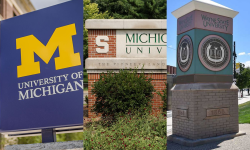Opinion | Michigan community colleges better than portrayed, but need help
Michigan community colleges largely agree with a recent report on community colleges published by Business Leaders for Michigan. First, we must continue to improve our student success outcomes. Second, there are significant opportunities for the state, employers and our colleges, led by locally elected trustees, to align efforts to optimize Michigan’s talent development strategy and close the skills gap.

While we agree on these points, we want to be clear that the metrics used in this report — the report noted that Michigan ranks 49th nationally in community college completion and 48th for its 10-year enrollment growth — do not paint a comprehensive picture of the students served by Michigan community colleges.
The report only analyzes graduation rates of first-time college-going students who are enrolled full-time. This cohort represents less than a quarter of all the degree-seeking students we serve. It doesn’t include students who transfer to a four-year institution as a success even though that is what most first-time, full-time students say is their intended goal.
Additionally, it doesn’t account for students recruited by employers prior to graduation to fill in-demand jobs in industries plagued by acute labor shortages such as IT, manufacturing and skilled trades. There are more holistic, nationally comparative metrics to cite that include part-time students, students who are returning to college after stopping out, and transfer students.
When all students are included, our student success rate is 46 percent and recently our six-year success rate improved by nearly 7 percentage points over five years. That does not mean Michigan community colleges have declared mission accomplished. We are deeply committed to improving completion and transfer rates for our students.
Beyond traditional degree-seeking students, our institutions also contribute immensely to the well-being of the communities in which they are anchored. Community colleges provide customized workforce development to employers. We deliver short-term training resulting in industry-recognized credentials. We partner with K-12 school districts to offer dual enrollment opportunities to high school students. We support adults with limited English proficiency or basic skills in earning their high school equivalency. We offer enrichment opportunities to our citizens interested in pursuing life-long learning.
Furthermore, our community colleges are open-access institutions, meaning we accept all students, regardless of academic preparation and provide them with the support they need to achieve their educational goals.
MCCA recognizes that we can and must do better to help more students earn a certificate, associate degree and/or transfer to a university which is why all 31 community and tribal colleges supported MCCA's new mission statement that explicitly centers on student success.
It is also why we have invested in our own Michigan Center for Student Success for over a decade which has led transformative work focused on developmental education reform, transfer student success, and student basic needs. MCCA manages a credit transfer portal and we are now a Top 5 state when it comes to successful transfers.
To continue making progress toward our collective goals, Michigan must invest more in community colleges. Community colleges are consistently underfunded through operation appropriations and capital outlay. Our students suffer from inequitable last-dollar financial aid policies that don’t help the neediest students.
Michigan has failed to invest in policies to encourage students to attend and remain enrolled in community colleges such as incentivizing employers to help students complete a certificate or associate degree while working, demanding that universities accept community college transfer credits, and ensuring community college students who are accessing federal and state-funded social safety net programs are not penalized.
The report calls on the State to create a state agency dedicated to higher education, and last week, Gov. Gretchen Whitmer did just that. In creating the Michigan Department of Lifelong Education, Advancement and Potential (MiLEAP), Gov. Whitmer reinforced her commitment to improving postsecondary educational access, affordability and attainment for all Michiganders.
Michigan community colleges are eager to help craft the priorities of the Office of Higher Education – and in fact, we have a starting to-do list. MiLEAP and its Office of Higher Education should focus on designing equitable financial aid programs, building upon its robust longitudinal data system, coordinating efficient transfer between institutions, ensuring access to dual enrollment, expanding access to labor market data, and streamlining reporting across agencies and departments.
MiLEAP should align policy and resources in support of the Sixty by 30 goal – but not add additional layers of bureaucracy or diminish the role of the on-the-ground presidents and trustees who customize their colleges to meet the needs of their local employers and communities.
Michigan’s network of locally governed community colleges are essential drivers of equity and of economic and social mobility, fueling the prosperity of our workforce, our employers, and our communities. As Dr. Jill Biden, a community college professor and the First Lady, recently said, “Community colleges meet students where they are, train students for real-world jobs, and tailor programs to the communities they serve.” We are committed to propelling Michigan into a Top 10 state and look forward to rolling up our sleeves together with BLM and policymakers to outline a plan to do just that.
See what new members are saying about why they donated to Bridge Michigan:
- “In order for this information to be accurate and unbiased it must be underwritten by its readers, not by special interests.” - Larry S.
- “Not many other media sources report on the topics Bridge does.” - Susan B.
- “Your journalism is outstanding and rare these days.” - Mark S.
If you want to ensure the future of nonpartisan, nonprofit Michigan journalism, please become a member today. You, too, will be asked why you donated and maybe we'll feature your quote next time!




